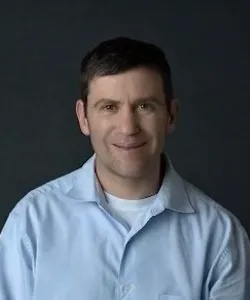Senior Lecturer Ken Frauwirth's Personal Story
It may sound cliché, but for almost as long as I can remember I have wanted to be a scientist. I grew up in the suburbs of New Bedford, Massachusetts. Although New Bedford is not known as a hotbed for biological research, it served as an important influence in my choice of career path. New Bedford is historically and currently one of the most important fishing ports in the US, and is most famous for being the whaling capital of the world until the late 19th century (as reflected in the start of the whaling voyage in Moby-Dick.). As a result, ecology, conservation, and marine biology have always been important to the well-being of the region. Trips to the Boston Museum of Science and New England Aquarium helped foster my interest in science as a child, as did whale watching trips from Cape Cod and visits to a local Audubon Society bird sanctuary. Science as an essential player in society, and as a potential field to pursue, was something that was instilled in me at an early age.

As a kid my science interests were pretty broad, and there were times that I was certain that I was going to be an astronaut or a paleontologist (I realized early on that first baseman for the Boston Red Sox was off the table). But by the time I reached high school, I knew that I wanted to do basic biological research, and the turning point actually came from my Jewish heritage. Starting from first grade until freshman year in high school, I attended an after-school “Hebrew school”, which combined religious and cultural studies. In fifth or sixth grade we had the opportunity to do an independent research project that involved writing reports on various prominent Jews throughout history. These included athletes, politicians, authors, and scientists, some well-known to me even then (i.e. Albert Einstein), and others that I first learned about as part of the project. The one that probably changed my life was Jonas Salk. At the time I had never heard of him, but he soon became my hero. My father’s younger sister died of polio as a child, just before the Salk vaccine became widely available, so the story had a very personal component for me. And the idea that basic research could have such a huge and immediate effect on society was something of an epiphany at that age.
In high school, my interests in both chemistry and biology (I took both AP classes) eventually led to a biochemistry major at Brown University, and graduate studies in an immunology lab at the University of California, Berkeley. Further post-doctoral research on the regulation and metabolism of T lymphocytes established the scope of the lab that I ran here at the University of Maryland for my first 9 years (I actually joined the department as a tenure-track assistant professor). However, I learned that writing grant applications is not my forte, and came to a crossroads when my application for tenure was denied. I was fortunate to receive a second lease on academic life when I was offered the opportunity to continue on as a professional-track instructor. I believe that my diverse scientific interests and adaptability played a major role in having that second-chance opportunity, and I have taught 10 different courses, at every level from BSCI105 (intro biology) to CBMG688Q (graduate-level vaccinology). My lifelong love of science fiction (begun after reading A Wrinkle in Time as part of an elementary school summer reading program) has even led me to develop three different seminar classes for the University Honors program, all exploring different facets of how scientific progress impacts society.
Throughout my education, I have had the good fortune to be mentored by people who appreciate the holistic nature of science, and understand that knowledge rarely fits into silos. Studies of the development of the C. elegans body plan, or the mechanism of DNA replication in the single-celled protist Tetrahymena, can lead to breakthroughs in understanding cancer. Genetic studies of Drosophila embryo dorsal-ventral patterning can change the way we approach vaccine development. I have tried to use this guiding principle in my teaching, and am a firm believer that it is essential to keep a broad perspective on science.
Written by Ken Frauwirth


